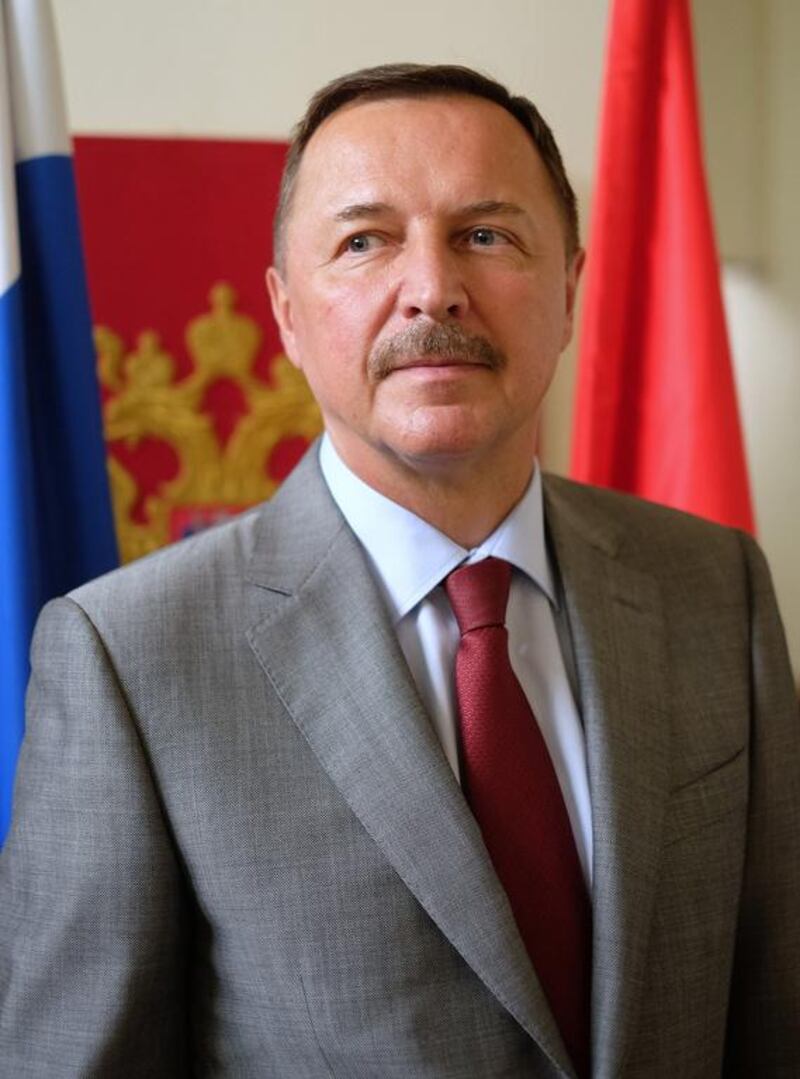ABU DHABI // The UAE is one of half a dozen countries set to meet in Moscow tomorrow to explore the new technologies on display at Russia’s largest annual nuclear industry exhibition.
A delegation from the Emirates Nuclear Energy Corporation (Enec), headed by its chief executive Mohammed Al Hammadi, is expected to attend the eighth AtomExpo and visit Russia’s leading nuclear institutes, laboratories and new generation reactors.
“They are the plants of the future,” said Alexander Efimov, Russia’s ambassador to the UAE. “We discussed it with Mr Al Hammadi – the UAE always looks to the future, so we’re ready to propose such plants and modern technology for fuel recycling and nuclear waste.”
The UAE and Russia signed a 15-year-agreement in 2012 making the federation one of the Emirates’ suppliers of enriched uranium for its power plant.
The contract is expected to cover more than 50 per cent of the total Barakah project requirements for the first 15 years of its operation.
Officials say this could be the beginning of collaboration in other nuclear fields.
“Our abilities are not just limited to these fuel supplies,” Mr Efimov said. “We’re ready to build new power stations and there are many fields in which we have great experience.”
The UAE will be introduced to a number of sectors that could be of interest during the three-day event, including using desalination units for nuclear power plants and creating a nuclear science and technology research centre to train staff and develop nuclear medicine.
“We understand the leadership is very wise to develop this industry because some countries have oil, solar energy and others but the UAE understands the very great importance of nuclear in producing energy because it really is environmentally friendly,” the ambassador said.
The world’s first nuclear power plant was built in the Russian city of Obninsk, about 110km from Moscow, in the early 1950s.
“Today, Russia is one of the global leaders in the nuclear industry,” said Anton Khlopkov, director of the Moscow-based think tank Centre for Energy and Security Studies.
“It has 35 power reactors in operation and seven under construction. Russia itself has 53 nuclear research reactors and facilities, which is more than any other country. It has also built 20 research reactors in other countries.”
The government-owned Russian atomic energy body, Rosatom, has a complete nuclear fuel cycle at its facilities, which offers Russian companies a competitive advantage, especially when dealing with newcomers such as the UAE, who do not yet have the expertise or infrastructure to produce nuclear fuel and manage spent fuel.
“All the Middle Eastern customers without exception fall into that category,” Mr Khlopkov said.
“Rosatom can offer a comprehensive proposal for the entire life of the nuclear power plant. Such an option is planned for the Akkuyu project in Turkey, the Amra project in Jordan and the El Dabaa project in Egypt.”
He said Rosatom-family company Techsnabexport started delivery of low-enriched uranium (LEU) for fuel production for the UAE’s plant in 2014.
“So the fuel assemblies transported to the UAE last month for Unit 1 of Barakah contain LEU produced in Russia,” he said.
The UAE is also taking steps in reducing its carbon emissions, an area in which nuclear is a pioneer. “Russia’s 35 nuclear units prevent the emissions of 250 million tonnes of CO2 annually,” said Alexander Voronkov, chief executive of Rosatom Middle East and North Africa.
“That is comparable to the total emissions produced by all the cars used in Russia over two years. It’s really significant and similar effects could be reached in the UAE by the production of nuclear energy. It is the first step in this area between our two countries.”
At its full operational capacity, the Barakah plant’s four reactors will deliver up to a quarter of the UAE’s electricity needs from carbon-free energy.
Cmalek@thenational.ae






